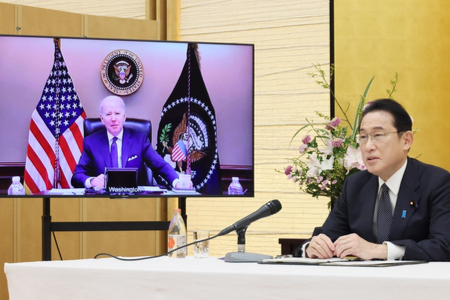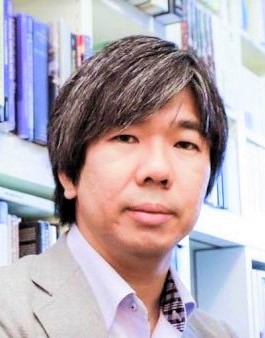“API Geoeconomic Briefing” is a weekly analysis of significant geopolitical and geoeconomic developments that precede the post-pandemic world. The briefing is written by experts at Asia Pacific Initiative (API) and includes an assessment of burgeoning trends in international politics and economics and the possible impact on Japan’s national interests and strategic response. (Editor-in-chief: Dr. HOSOYA Yuichi, Research Director, API; Professor, Faculty of Law, Keio University; Visiting Fellow, Downing College, University of Cambridge)
This article was posted to the Japan Times on February 22, 2022:
https://www.japantimes.co.jp/opinion/2022/02/22/commentary/japan-commentary/kishida-realism-diplomacy/

Photo: Prime Minister’s Office
February 22, 2022
What Kishida’s ‘realism diplomacy for a new era’ actually means for Japan
HOSOYA Yuichi
Research Director, API;
Professor, Faculty of Law, Keio University;
Visiting Fellow, Downing College, University of Cambridge

Prime Minister Fumio Kishida is gradually drawing an outline for his administration’s foreign policy.
In his New Year’s address, Kishida said he “will advance ‘realism diplomacy for a new era,’ taking as its three pillars the importance of universal values, efforts to resolve global challenges and efforts to resolutely and fully defend the lives and livelihoods of the Japanese people.”
He first used a form of the phrase “realism diplomacy for a new era” in a structured way in a speech he made a week earlier, on Dec. 22. “A policy group called Kochikai, where I was nurtured as a politician, has long upheld what we call realism diplomacy,” he said.
It was notable that Kishida used the term “realism” to redefine the image of Kochikai, which is often viewed — in a completely opposite way — as a liberal policy group within the Liberal Democratic Party.
Some media reports say that Kishida doesn’t like to be regarded as a liberal politician. By labeling his foreign policy stance as “realism,” he is apparently trying to avoid being criticized by conservative members of the party.
But what kind of policies is he aiming at under “realism diplomacy for a new era?” How will the diplomatic policies of the Cabinet led by a Kochikai leader differ from previous policies?
Will realism diplomacy lead to any changes in political dynamics within the LDP that supports the administration?
Kishida’s diplomacy can be discussed in the context of political dynamics within the party and the postwar history of LDP politics.
Kishida the Machiavellian
Because Kishida leads Kochikai, a traditionally liberal LDP faction, some assume he will promote liberal policies.
However, Kishida seems to prefer being recognized as a realist, and even acted like a Machiavellian when he won in the LDP presidential election.
In Japan’s postwar political history, three mainstream factions have held a prominent position in the LDP. They are: Heisei Kenkyukai, a centrist faction currently headed by Toshimitsu Motegi; conservative Seiwa Seisaku Kenkyukai, currently led by former Prime Minister Shinzo Abe; and Kochikai.
The influence of factions has been declining recently. Also, historically speaking, members of each faction have not always been united under a single philosophy or policy concept.
Still, the three factions’ making and breaking of alliances, as well as their conflicting relationships, have often determined the dynamics of the party’s politics.
Today, the LDP’s largest faction is Seiwa Seisaku Kenkyukai, and in order for Kishida to maintain a stable political foundation within the party, obtaining the support of the faction, and particularly Abe, is indispensable.
This means the Kishida administration needs to lean more to the right rather than being centrist to hold on to its power base within the party and also continue to be regarded favorably by voters who support the LDP.
In fact, Kishida was the foreign minister for the Abe administration that was launched in December 2012, and the realism in the administration’s diplomacy was partly achieved by Kishida.
Kishida and Abe, both of whom won a seat in the Lower House for the first time in 1993, are longtime allies with deep trust in each other.
We can say that the Abe administration’s realism diplomacy is a result of cooperation between Abe and Kishida.
‘Free and Open Indo-Pacific’
Therefore, it is natural that the Kishida administration succeeds Abe’s realism diplomacy to a considerable extent.
Kishida also inherits the “Free and Open Indo-Pacific Strategy” which he himself had contributed to launching and spreading.
We must note the fact that Kishida is not only keeping Abe’s realism diplomacy as a basic policy but also implementing realism in party politics that can be interpreted as Machiavellian.
After losing in the September 2020 LDP presidential election to Yoshihide Suga, Kishida shifted from the compromising and reconciliatory style of politics to adopt more Machiavellian tactics both in policies and political affairs, making important decisions quickly according to situations.
Otherwise, Kishida, who had not been regarded so highly as a candidate for the next prime minister, could not have won the LDP presidential election by beating other candidates including then-Environment Minister Shinjiro Koizumi, who enjoys great popularity among the public, Taro Kono, backed by former LDP Secretary-General Shigeru Ishiba, and Sanae Takaichi, who has strong support from conservatives within the party.
It came as a surprise to many people that Kishida gained the most votes in the first round of voting for the election by the party’s lawmakers and members. This probably led to Kishida’s victory in the runoff, giving him cohesive power after the launch of his administration.
Following his loss in the 2020 presidential election, Kishida actively showed an eagerness to get younger outstanding lawmakers involved in putting together his policy agenda, asking advice from influential middle-ranking lawmakers in his faction such as Seiji Kihara, Hideki Murai and Fumiaki Kobayashi.
Such a move gave a good impression to the party’s young lawmakers who don’t belong to a faction amid a growing intergenerational divide in the party.
Kishida also made a noteworthy unprecedented decision in appointing Tatsuo Fukuda, who led a group of younger LDP lawmakers working to reform the party, as the chief of the party’s General Council, one of the party’s top positions.
On the other hand, he appointed Hirokazu Matsuno, a member of Abe’s faction, to the key government post of chief Cabinet secretary, while appointing Shunichi Suzuki of Taro Aso’s faction to succeed Aso as finance minister and Motegi as the party’s secretary-general, demonstrating his consideration for the mainstream factions.
Balancing different forces and generations within the party using his own leadership rather than outside pressure is nothing but Machiavellian realism.
After all, it was a matter of course to some extent that Kishida was elected the party’s president as he succeeded in winning support of both the younger lawmakers and the heads of key factions of the party.
Diplomatic realism
Kishida’s ability to accurately grasp the distribution of political power and establish a balance that works to his advantage can be seen also in his diplomatic tactics.
His diplomatic strategy is similar to realism adopted by Klemens von Metternich, who served as Austrian foreign minister following the Napoleonic Wars, or Otto von Bismarck, chancellor of the German Empire in the 19th century.
For instance, amid growing pressure from democratic countries including the United States and the United Kingdom for a diplomatic boycott of the 2022 Beijing Olympics that took place this month, Kishida announced on Dec. 24 that Japan would not send ministers or senior government officials to the games, while avoiding calling it a diplomatic boycott.
At the same time, as Japan faces a difficult situation amid the U.S.-China confrontations, Kishida showed some consideration to China after it supported Japan in hosting the Tokyo Olympics last summer, by saying that the government would send Yasuhiro Yamashita, chief of the Japanese Olympic Committee, and Seiko Hashimoto, president of the organizing committee of the Tokyo Olympics and Paralympics.
The year 2022 marks the 50th anniversary of the normalization of diplomatic ties between Japan and China.
In starting such a milestone year, Kishida managed to avoid a worst-case situation in Japan-China relations while at the same time promoting human rights diplomacy, one of his key agenda items, and showing his willingness to share the same values with the U.S.
Amid China’s rising military threats, Japan held so-called two-plus-two talks involving foreign and defense chiefs with the U.S. in January.
As Japan and the U.S. work on creating new national security strategies, it is important for the two countries to keep the goal of sharing fundamental values including human rights and democracy.
Focusing only on arms buildup or increasing hostile relationships with other countries do not necessarily amount to realism.
Diplomatic realism means having a sense of balance that serves national interests and making rational judgments to secure an advantageous position in the global community.
If the Abe administration’s realism diplomacy was about strengthening the U.S.-Japan alliance and seeking a stable China-Japan relationship, the Kishida administration is making the right decision in basically following the same path.
Upper House election
However, the Kishida administration is facing even more difficult challenges this year.
The government of U.S. President Joe Biden could become more inward-looking in terms of diplomacy ahead of midterm elections in November.
Moreover, while Kishida needs to maintain good relations with the LDP’s coalition partner Komeito, which wants to improve ties with China, tensions with the country might rise if Beijing takes a stronger stance regarding Taiwan after the Olympics.
In domestic politics, as Nippon Ishin no Kai gains increasing support by reaching a cooperation agreement with the Democratic Party for the People, it is vital for the LDP to win the Upper House election this summer to achieve long-term rule for the Kishida administration.
But the administration’s path to long-term rule is not smooth.
That is why Kishida must learn a great deal from the art of governance from the long-ruling Abe administration that combined conservative ideologies with diplomatic realism.
Disclaimer: The views expressed in this API Geoeconomic Briefing do not necessarily reflect those of the API, the API Institute of Geoeconomic Studies or any other organizations to which the author belongs
 APIニュースレター 登録
APIニュースレター 登録